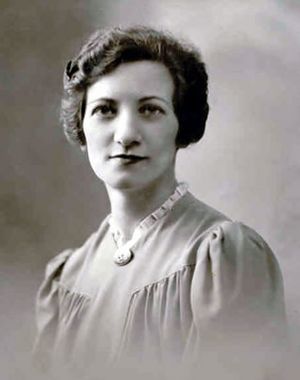Léa Roback facts for kids
Quick facts for kids
Léa Roback
|
|
|---|---|

Photo of Roback in the collection of the Jewish Public Library
|
|
| Born | November 3, 1903 |
| Died | August 28, 2000 (aged 96) Côte-des-Neiges, Montreal, Quebec, Canada
|
| Education | University of Grenoble (B.A.) |
| Political party | KPD (1929-1932) CPC (1932–1958) |
Léa Roback (born November 3, 1903 – died August 28, 2000) was a brave Canadian woman. She worked hard to help others. Léa was a union organizer, which means she helped workers get fair treatment. She was also a social activist, fighting for what was right. She believed in peace (a pacifist) and equal rights for women (a feminist). Léa spoke many languages and was one of the first women to fight for women's right to vote in Quebec. She always stood up against unfairness, violence, and racism.
Contents
Léa Roback's Early Life
Léa Roback was born in Montreal, Quebec, in 1903. She was the second of nine children. Her parents were Jewish immigrants from Poland. Her father was a tailor, and he and her mother, Fanny, ran a general store.
The family lived in Beauport for a while. They were the only Jewish family there. At home, Léa spoke Yiddish. She spoke French with her neighbors in Beauport. At school, she spoke English. Her family loved reading and art. Léa was inspired by her grandmother, who was a very independent woman.
In 1915, Léa's family moved back to Montreal. Léa started working at British American Dyeworks. This job helped her see the differences between rich and poor people in Montreal. Later, she worked as a cashier at Her Majesty's Theatre.
Léa loved books and wanted to learn more. She saved her money to go to the University of Grenoble in France in 1926. She earned a Bachelor of Arts degree there. After her studies, she joined her sister in New York City.
Léa Roback's Career and Activism
In 1929, Léa went to Berlin, Germany, to visit her brother Henri. He was studying medicine there. Léa learned German and took university classes. She taught English to help pay for her studies. She also visited England and Italy. During this time, she became very interested in Communism.
On May 1, 1929, Léa joined the Communist Party of Germany. She felt that some political groups talked a lot but didn't act. So, she decided to support Marxism-Leninism, which focused on action. Léa said this time helped her truly understand politics.
By 1932, the Nazis were becoming very powerful in Germany. Since Léa was Jewish, a foreigner, and a Communist, her professors told her it was safer to leave. She returned to Montreal and joined the Communist Party of Canada.
In 1934, Léa spent a few months in the Soviet Union. When she came back to Montreal, she helped organize unemployed people. She worked with Norman Bethune, a famous doctor and activist. She also worked at the Young Women's Hebrew Association. In 1935, she opened the first Marxist bookshop in Montreal, called Modern Book Shop.
Fighting for Women's Rights
In 1936, Léa Roback worked with Thérèse Casgrain to fight for women's right to vote in Quebec. This was called the suffrage movement.
That same year, a union called the International Ladies' Garment Workers' Union (ILGWU) sent an organizer named Rose Pesotta to Montreal. Léa helped Rose set up the ILGWU there. Léa was very helpful because she could speak Yiddish, French, and English. This helped her talk to many different garment workers. In 1937, she helped organize 5,000 garment workers who were on strike.
Léa also helped workers at RCA Victor form a union in 1941. She worked there until 1951. In 1943, she helped win the first union contract for women. This meant women workers got better pay and conditions. Even though she was good at it, Léa did not want to become a union leader.
Political Work and Later Activism
Léa was a political organizer for Fred Rose. He won an election in 1943, partly thanks to her help.
Léa slowly moved away from the Communist Party of Canada. She left the party in 1958 after the Soviet invasion of Hungary.
In 1960, Léa joined a group called "Voice of Women" (La Voix des Femmes). She worked with other important women like Madeleine Parent and Thérèse Casgrain. She spoke out against the Vietnam War and apartheid (a system of racial segregation) in South Africa. She also fought against nuclear weapons and for everyone to have access to good education.
Léa also worked to get better housing for people in Saint-Henri. When she was 83 years old, she marched in the rain with other women. They were fighting for equal pay for women. In 1985, she became an honorary member of the Canadian Institute for Research on Women. Léa Roback passed away in Côte-des-Neiges in 2000. In the same year, she was made a Knight (Chevalier) of the National Order of Quebec.
Léa Roback's Legacy
"There is nothing that I like better than to be standing on a street corner, passing out leaflets, because it is how you come to understand what people are about."
- L. Roback
Léa Roback's work continues to inspire people. The Léa Roback Foundation was started in 1993. It gives scholarships to women who are committed to helping their communities.
"Le centre Léa-Roback" is a research center in Montreal that studies social inequalities. It is named after her. The Maison Parent-Roback, a building for women's groups, is also named in her honor.
In 1991, Sophie Bissonnette made a documentary film about Léa Roback's life. In the 2000s, two streets were named after her: Rue Léa-Roback in Montreal and another street in Beauport, where she grew up.
The Léa Roback Foundation (Fondation Léa Roback) gives scholarships to women in Quebec. These women must be involved in social causes and need financial help.

